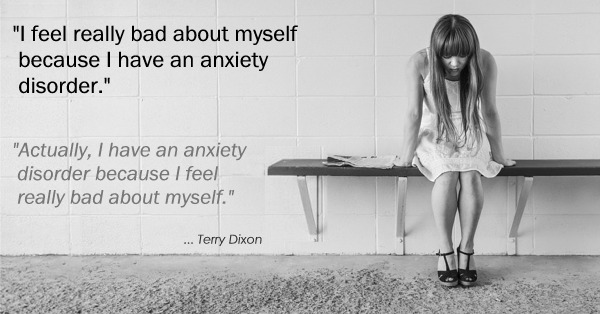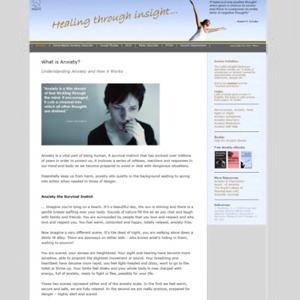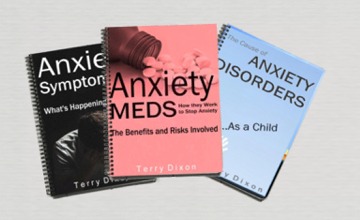|
.
|
But for some of us things change... our anxiety grows stronger. It comes out more and more, for no apparent reason, and we begin to get too anxious,
too easily, too often.
Upsetting physical things start to happen. We become more nervous in general (particularly in public situations) and begin to experience problems such as shakiness, heart
palpitations, breathlessness, dizziness, excessive sweating, nausea and worrying – any symptom related to anxiety can appear – and worrying
about these symptoms only makes them worse for it increases the anxiety.
Many people live like this, in a heightened state of anxiety. They feel nervous often and it can be a daily struggle against negative thoughts and horrible physical symptoms. At this stage (and
many stay at this stage) the problem is the high anxiety itself and the awful way it makes us think and feel.
For some, however, it doesn't stop there. Anxiety continues to increase and it can get so bad that it leads to additional, more complicated problems such as uncontrollable worrying, panic attacks that come
out of the blue, obsessive thoughts and compulsive behaviours, irrational fears and phobias (particularly social phobia) and, in some cases, even severe depression. Now it's the extreme thoughts and
behaviours themselves (the 'disorder') – driven by the anxiety – that become the main focus of the problem.
Why does this happen?

Today, cognitive (thinking) and behavioural problems involving high anxiety and fear are classed as anxiety disorders. This is based on the medical model, which views these
problems as mental illnesses, 'disorders' where something goes wrong in the brain and the answer lies in 'fixing' the thing that has gone wrong – often with medication.
However...
Take the middle-aged woman (emotionally fragile from early life stress and conflict) who suffers emotional abuse at the hands of her
partner – abuse that not only scares her but also makes her feel that she cannot do anything right and that everything she
tries will fail miserably or is totally worthless. Is her generalized anxiety disorder (or severe depression for that matter) simply the result of something
going wrong in her brain that can be fixed by medication?
What about the man in his early twenties, riddled with anxiety, whose father constantly put him down and criticized him with such venom as a
child that he's now petrified others will do the same. Is his social phobic behaviour truly dis-ordered and irrational?
Or the teenage girl brought up by overly strict religious parents that have so drummed the fear of God into her that all she can do to
obtain relief (from punishment by the Lord) is turn to rituals. Are her obsessive, fearful thoughts and compulsive behaviours really all down to mental illness?
Generalized anxiety disorder, OCD, social phobia, PTSD, panic disorder, severe depression – are any of these problems truly irrational, dis-ordered and mental illness?
How many 'normal' people...
 Say "Touch Wood" so as not to tempt fate? Say "Touch Wood" so as not to tempt fate?
 Repeatedly check doors, windows, switches? Repeatedly check doors, windows, switches?
 Take a drink before social functions? Take a drink before social functions?
 Avoid public speaking at all costs? Avoid public speaking at all costs?
Almost everyone displays behaviours associated with anxiety disorders (such as troublesome thoughts, over-checking, the need for perfection, increased anxiousness, moments of panic and
periods of despair) to some degree at some time in his or her life – more so in times of stress – for these actions reflect the subconscious ways we try to
protect ourselves.
When we look at the backgrounds of large numbers of people with anxiety disorders they are often strikingly similar in many ways. Over-exposure to numerous/severe stressful life experiences
and subsequent feelings of deep insecurity occurs across the board, with such regularity, that this must play a major role in the development of these problems.
However, it's not just the effects of suffering extreme levels of insecurity and fear that we need to consider. There's something else at
play... something that's also caused by those stressful life experiences... the shattering of self confidence.
Anxiety Disorders and Self Confidence – Feeling in Some Way 'Bad' or 'Wrong' or 'Not Good Enough'

Research shows that over 50% of anxiety problems start before the age of fourteen and many people with long-term anxiety disorders, when asked what they remember
most about the start of their problem, reply "Being really nervous for a long time".
The way we feel about our self in childhood and adolescence can stay with us a lifetime and those who are frequently made to feel insecure and vulnerable when growing up (or later in
life for some) are surely more susceptible to develop anxiety-related problems down the line.
If we go through a period in life where we are constantly 'put down', 'picked on' or made to feel threatened in any way it's not surprising that anxiety (our inner self-protection instinct)
will ramp up and we'll become more nervous – constantly wary and alert, always on the look out for danger in order to protect ourself.
However, threatening situations not only scare us, they also make us feel bad (upset, hurt, insecure, weak, afraid, small, inadequate, sad, angry, confused... a whole myriad of negative
feelings). And if we feel bad often enough, for long enough, we can start to believe that we feel this way because there is something inherently 'bad' or 'wrong' or 'not good enough' about us. Over time, self
confidence crumbles.
This highlights a critical component in the development of these problems that hasn't really been considered until now: the way we feel about ourself deep down and
how this becomes inextricably linked to being scared.
It is this, not mental illness, that lies at the heart of most anxiety problems and disorders today. It also lies at the heart of their cure.
And so, all that you read from 'Help-For' is based on the premise:
 Not diseases, disorders or mental illness, anxiety and
depression problems involve natural survival instincts common to us all – normal self-protective thoughts, feelings and behaviours that become over-sensitive and intensified,
grossly exaggerated and out of control.
Not diseases, disorders or mental illness, anxiety and
depression problems involve natural survival instincts common to us all – normal self-protective thoughts, feelings and behaviours that become over-sensitive and intensified,
grossly exaggerated and out of control.
They are born out of suffering too many (or too severe) high stress, emotionally painful life issues and events... ones that leave us constantly feeling bad, weak and vulnerable.
In essence, anxiety problems stem from our subconscious trying to protect us when life has made us afraid. And 'disorders' develop, strengthen and grow from our mind's attempts to explain and
resolve the intangible fear we feel inside.
Once we see these problems for what they really are, everything changes. Now it's possible to cure them completely. Understanding and acceptance allows hurt to heal, removes self-doubt and
starves fear of its fuel. Understanding and accepting that your problem is totally justified, given your life experiences, offers the one, true way to fully extinguish the
smouldering ball of bad feelings inside (the thing that keeps the fear alive) and move beyond anxiety to become the strong, confident, unique, worthy individual that it's your birthright to be.

For greater insight and help available, check out:-

Our website. Explore anxiety... symptoms, problems, meds, disorders etc. in greater detail and gain a new perspective on these problems.

The Start of it All Menu

Our Free Anxiety eBooks

• Essential information on anxiety disorders, anxiety meds and anxiety symptoms.
• These books are totally free to read on-screen, download and print – no personal details required.
›› More Details

Our Self-Help PDFs

›› More Details

Our Self-Help Books
Combining massive relief-bringing "aha" moments over "what is happening and why" with proven techniques to reduce anxiety
and build real self confidence, these books show you how to overcome anxiety-related problems completely and naturally without therapy or medication.
Books Available:-
 Calm Anxiety: Taking Back Control (For high anxiety) Calm Anxiety: Taking Back Control (For high anxiety)
– This book is for anyone who is frequently too nervous or too anxious and has growing feelings of 'not being good enough in some way'.
 Evolving Self Confidence: How to Become Free From Anxiety Disorders and Depression (For anxiety disorders, severe depression and more) Evolving Self Confidence: How to Become Free From Anxiety Disorders and Depression (For anxiety disorders, severe depression and more)
– This book is for any person who has been too nervous/anxious for a long time (months/years) and is now starting to experience such things as: uncontrollable worrying, panic attacks out of the blue, obsessive thoughts and compulsive
behaviours, crippling social fears and phobias, chronic post-trauma stress, greater depression
or
anyone who is suffering from/has been diagnosed with a full-blown, long-term anxiety disorder (incl. severe depression)
.
|
.
|
|
.
|
Overcome high anxiety, nervousness and low self esteem.
Why am I more nervous than my friends, my family, my colleagues?
Why do I get so anxious in certain situations?
How can I stop it?

A unique way to understand and deal with the increased anxiety that plagues so many of us today, this book answers the ultimate
question: "Why am I so anxious all the time?" and shows you how to use this knowledge to stop all the fear, anxiety and self-doubt.
'Goes To The Heart of the Matter' (Amazon Review)
 This is a very helpful book for the anxious among us. It is not a CBT or ACT book. 'Calm anxiety' has a distinct approach to anxiety. In fact, the book covers it
all: the fight-or-flight response, neural connections, upbringing and beliefs, gradual automation, acceptance of feelings and so forth. Dixon beautifully ties it all
together.
This is a very helpful book for the anxious among us. It is not a CBT or ACT book. 'Calm anxiety' has a distinct approach to anxiety. In fact, the book covers it
all: the fight-or-flight response, neural connections, upbringing and beliefs, gradual automation, acceptance of feelings and so forth. Dixon beautifully ties it all
together.
Most books on anxiety, like the ones based on CBT and ACT, have 'techniques' as their core. 'Calm anxiety', however, goes deeper. It focuses on the way we were 'conditioned'
to believe we are not good enough. Here is were the book goes further than other books. The core feeling of not being good enough is addressed. Dixon emphasizes that it is
important to say to yourself that there are good reasons for you to feel the way you do. This is acceptance and stops fighting anxious feelings. Furthermore, you now know
that you have been conditioned to believe that you are defective in some way. Therefore, the anxious feelings do not have the same meaning any more. You always were
good. This is the central idea in the book, which is elaborated. A highly recommendable read. Concise, though all encompassing.
I have had a few therapies and read numerous books on the topic. For me, this one stands out, because it goes to the heart of the matter.

Try 'Calm Anxiety' ›› Read the first chapter free on any device.
|
.
|